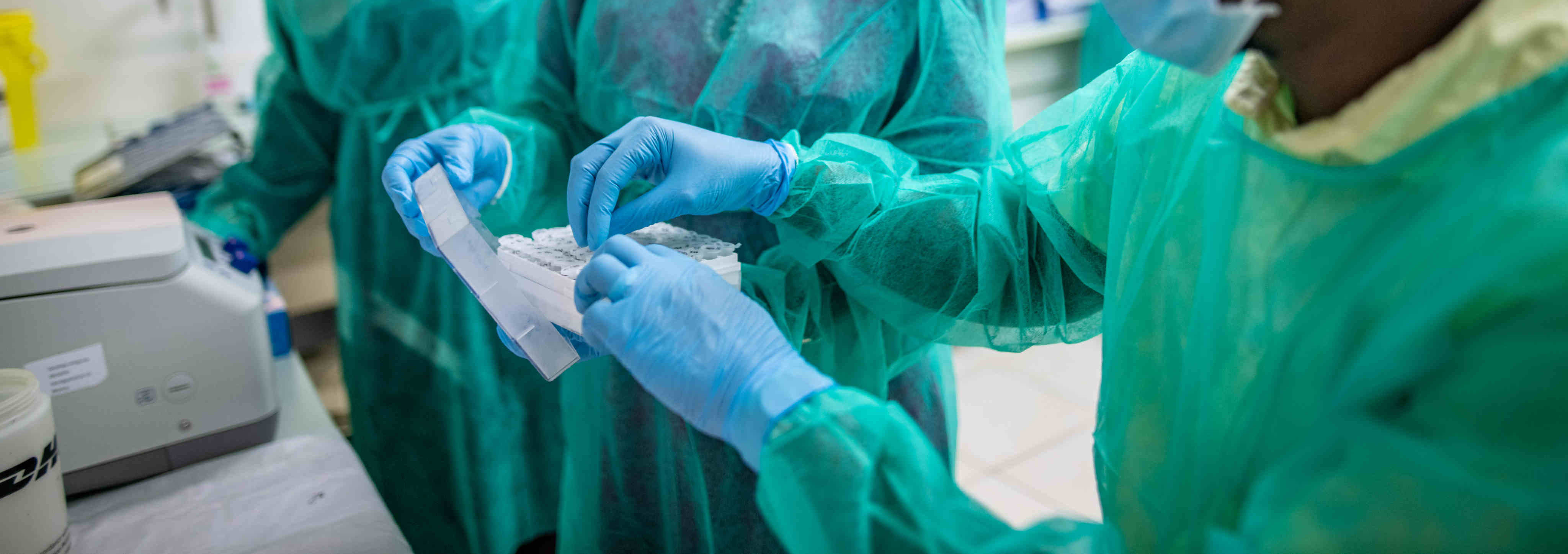
New ELASA (Aptamer-Based ELISA) for Ebola
Base Pair has been collaborating with Dr. Misaki Wayengera of Makerere (TMA2015CDF1545) University in Uganda to explore aptamers for the development of simpler, more sensitive assays for the diagnosis of Ebolavirus.
Ebolavirus is a filovirus that causes severe hemorrhagic fever with a high rate of mortality. Believed to originate with the fruit bat, the virus can be transferred from infected animals and insects and also through the transfer of blood, mucus, or interaction with infected materials. On August 1, 2018, the Ministry of Health of the Democratic Republic of the Congo in Africa declared a new outbreak of Ebola Virus Disease (EVD) in the North Kivu Province. As of June 9, 2019, there have been 1,968 confirmed cases and 1,296 confirmed deaths. An experimental vaccine is being administered and a clinical trial for a new therapeutic is underway.
GP1 glycoprotein appears as spikes on the surface of the Ebolavirus virion. The glycoprotein is a heterodimer consisting of a GP1 and GP2 subunit. The glycoprotein forms a trimer consisting of three heterodimers on the virion surface. The GP1 subunit is involved in attachment to host cells and includes a receptor-binding domain. The smaller GP2 subunit includes a fusion peptide, a transmembrane domain and a short cytoplasmic tail. Glycoprotein residues involved in host entry are highly conserved between Zaire, Sudan, Cote d’Ivoire and Reston species of Ebolavirus.
https://www.basepairbio.com/elasa-aptamer-based-elisa/
Articles
Test Article With Image
Test article 14 July 2025 with image TL
Read moreVirtual Workshop: Recognition And Control Of Mtb Infected Cells: From Basics To The Clinic | 13 – 14June 2023
The Stop
TB Partnership Working Group on New TB Vaccines (WGNV) and the National
Institute for Allergy and Infectious Diseases (NIAID)are
co-hosting a workshop on the topic of Recognition and Control of Mtb
Infected Cells: From Basics to the Clinic. This workshop is intended to address
the need for correlates and to identify platforms that measure recognition or
control of the infected cell - especially in humans - as identified in the EDCTP/AIGHD Global Roadmap for
Research and Development of New TB Vaccines and the Strategic Framework for
New TB Vaccines in the Stop TB Partnership Global Plan to End TB 2023 - 2030.
The overall goals of this workshop
are to:
- elucidate the mechanisms by
which the immune system recognizes the Mtb-infected cell
- explore the degree to which
such recognition can lead to control of the intracellular microbe, and
- discuss the translational
implications of these observations
The workshop format will be largely
discussion-based. Each session will have three short presentations that will
provide a high-level overview of key topics within the session theme, followed
by a discussion between the session chairs, speakers, and participants.
Click here
to view the programme and
speakers.
This workshop is free of charge and
open to any participants interested in this topic.
Ssi/Isid Infectious Diseases Research Fellowships | Deadline For Applications: 16 June 2023
The International Society for Infectious Diseases (ISID) and the Swiss
Society for Infectious Diseases (SSI) are inviting applications for their joint
Infectious Diseases Research Fellowship Program. The purpose of this programme
is to support infectious disease physicians and scientists from under-resourced
countries through multidisciplinary clinical and laboratory training at a
select biomedical institution in Zurich, Switzerland. The one-year SSI/ISID
Fellowship programme is open to applicants who are 40 years or younger,
citizens and permanent residents of under-resourced countries or Eastern
Europe. The deadline for applications is 16 June 2023.
More information: https://na.eventscloud.com/eSites/748378/Homepage